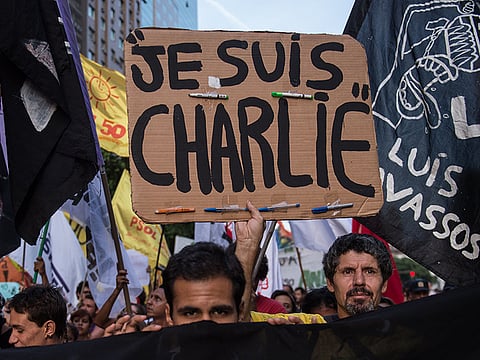Questions abound over Paris attacks
As a writer, I am a passionate advocate of freedom of speech. But I draw the line when it comes to hate mongering through racial, ethnic or religious taunts or insults.

The slogan Je Suis Charlie (I am Charlie) was adopted in an orgiastic fervour by hundreds of thousands if not millions of people in response to the terror attacks on the offices of the magazine Charlie Hebdo, a weekly satirical piece of journalism published out of Paris. But Je ne suis pas Charlie! (I am not Charlie). Having said that, I do not condone the violence that swept through Paris a few days ago, nor do I support the actions of the perpetrators in their murderous spree because they may have been offended by the magazine’s contents but to kill is a crime, and it is an indefensible act of terrorism when one tries to suppress another through violence, no matter where they stand. Let there be no question. This was terrorism. Islam does not condone the killing of the innocent even in a situation where someone insults or denigrates their religion. Nowhere in the Quran are there calls for retaliation against such transgressions. The Prophet Mohammad (PBUH) was ridiculed and insulted many times during his lifetime and falsely accused of lying about the revelations that came upon him. Yet he did not seek to punish or use violent means to overcome such insults. Instead he forgave and responded with kindness.
Glaring inadequacies
When the attacks that took place in the middle of the day on January 7 were first flashed live on television, I couldn’t help but notice the absence of traffic on the road. There appeared to be two masked men dressed as commandos who were firing randomly at anything that moved. Allegedly, cameramen, dressed with bullet proof vests, were filming the incident from the rooftop of the building where the shooting started. When the cameras zoomed in, the masked men shouted ‘Allahu Akbar’ clearly while they were being filmed. They left the scene calmly, leaving behind ID cards so that they could be readily identified. Initial reports claimed there were three people involved in the killing. The movements of the two masked men could not be tracked via CCTV throughout Paris. The hostage saga lasted three days. Another gunman took people hostage at a kosher supermarket. All three were eventually killed. There were no more tracks left to establish the truth. The men were identified within the minutes as Muslims and their motives exposed. The incident got maximum worldwide publicity. And Israel capitalised on this incredible publicity. Israeli premier Benjamin Netanyahu had earlier warned France that recognising Palestine was a great mistake.
Now pardon me for not believing that this event is as straightforward as it may appear. To begin with, I do not subscribe to the views of that hatemongering thrash they call a “satirical” piece of journalism, which is strongly defended by its supporters with cries of freedom of speech. If indeed it is freedom of speech that is on trial here, can someone explain why there are laws on the books throughout Europe forbidding questions raised about the Holocaust? These laws make it illegal to publicly ‘question, deny, play down, justify or approve of’ the genocide committed by the Nazis during the Second World War and the punishment is imprisonment. Where is the freedom of speech here? Were those who marched down the wide avenues of Paris aware of the existence of such binders on the freedom of speech?
Charlie Hebdo is a rag that claims it withholds no punches and considers all religions and people fair game. Yet its hypocrisy was perhaps nowhere better exemplified than the expulsion of one of its writers and artists in 2008 for writing about Zionism. His crime was bringing out a story that the magazine considered too anti-Semitic. Why was he fired and where was the freedom of speech then? Muslims the world over should understand that there will always be some who will seek to provoke. The best defence against such belligerence is ignoring the provocations, strengthening their faith and carrying on with their lives. Perhaps Pope Francis said it best when he stated that killing in God’s name is an ‘absurdity’. He added that “freedom of expression was ‘a fundamental human right like the freedom of religion, but it should be exercised without giving offence. One cannot provoke, one cannot insult other people’s faith, one cannot make fun of faith. Every religion has its dignity.”
As a writer I am a passionate advocate of the freedom of speech but I draw the line when it comes to hatemongering through racial, ethnic or religious taunts or insults. And that is exactly why je ne suis pas Charlie!
Tariq A. Al Maeena is a Saudi socio-political commentator. He lives in Jeddah, Saudi Arabia.
Sign up for the Daily Briefing
Get the latest news and updates straight to your inbox


